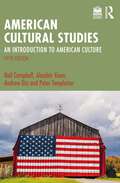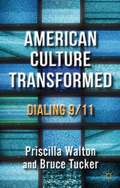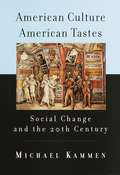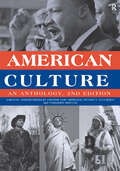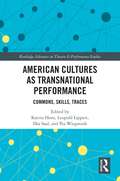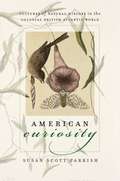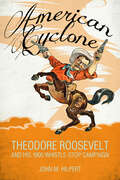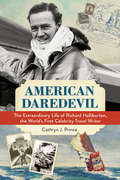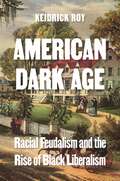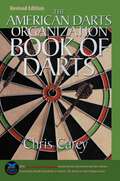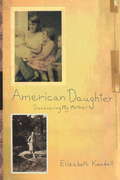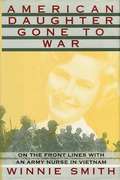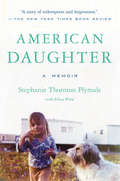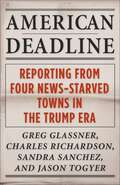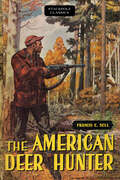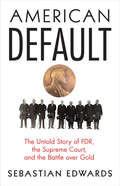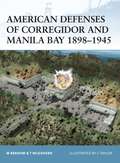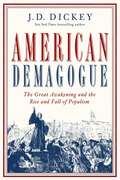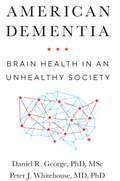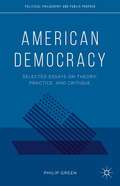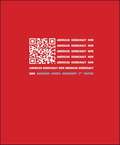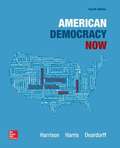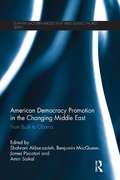- Table View
- List View
American Cultural Studies: An Introduction to American Culture
by Neil Campbell Alasdair Kean Andrew Dix Peter TempletonNow in its fifth edition, American Cultural Studies continues to offer a critical introduction to key concepts, topics and methods in the study of United States culture, exploring subjects that include the city, ethnicity and immigration, religion, youth, and gender and sexuality.The fifth edition has been comprehensively revised to take account of developments in American culture during the past decade. Arguments are supported by close readings of cultural materials that range from novels to paintings, films to political speeches and TV shows to regional cuisines. Updated case studies introduce each chapter, with examples including Moonlight, The Great Gatsby and the songs and videos of Lady Gaga. This book also offers a new chapter on class; extended discussion of gender and sexuality, including masculinities and trans culture; and increased coverage of sports in American culture, including baseball, wrestling and American football. To further engage contemporary readers, this edition provides up-to-date further reading suggestions for each chapter and considers the place of American cultural studies in the current moment.Of particular interest to undergraduate readers, this book is panoramic in its coverage of the field and is a core text for studying American culture.Instructor and student resources for this book include an interactive timeline of cultural and historical events, additional discussion questions and activities for each topic, and suggestions for further reading and online resources for each chapter.
American Culture Transformed
by Priscilla L. Walton Bruce TuckerThe bombing of the Twin Towers in New York on September 11, 2001, marked a major turning point in modern American culture. Authors Bruce Tucker and Priscilla L. Walton examine critical moments in the aftermath of 9/11 arguing that commentators abandoned complexity, seeking to reduce events to their simplest signification.
American Culture, American Tastes: Social Change and the 20th Century
by Michael KammenAmericans have a long history of public arguments about taste, the uses of leisure, and what is culturally appropriate in a democracy that has a strong work ethic. Michael Kammen surveys these debates as well as our changing taste preferences, especially in the past century, and the shifting perceptions that have accompanied them.Professor Kammen shows how the post-traditional popular culture that flourished after the 1880s became full-blown mass culture after World War II, in an era of unprecedented affluence and travel. He charts the influence of advertising and opinion polling; the development of standardized products, shopping centers, and mass-marketing; the separation of youth and adult culture; the gradual repudiation of the genteel tradition; and the commercialization of organized entertainment. He stresses the significance of television in the shaping of mass culture, and of consumerism in its reconfiguration over the past two decades.Focusing on our own time, Kammen discusses the use of the fluid nature of cultural taste to enlarge audiences and increase revenues, and reveals how the public role of intellectuals and cultural critics has declined as the power of corporate sponsors and promoters has risen. As a result of this diminution of cultural authority, he says, definitive pronouncements have been replaced by divergent points of view, and there is, as well, a tendency to blur fact and fiction, reality and illusion.An important commentary on the often conflicting ways Americans have understood, defined, and talked about their changing culture in the twentieth century.
American Culture: An Anthology
by Anders Breidlid Fredrik Chr. Brøgger Oyvind T. Gulliksen Torbjorn SirevagThis second edition of American Culture includes contemporary events and provides an introduction to American civilization. Extracts are taken from diverse sources such as political addresses, articles, interviews, oral histories and advertisements. Edited by academics who are highly experienced in the study and teaching of American Studies across a wide range of institutions, this book provides: texts that introduce aspects of American society in a historical perspective primary sources and images that can be used as the basis for illustration, analysis and discussion linking text which stresses themes rather than offering a simple chronological survey. American Culture brings together primary texts from 1600 to the present day to present a comprehensive overview of, and introduction to, American culture.
American Cultures as Transnational Performance: Commons, Skills, Traces (Routledge Advances in Theatre & Performance Studies)
by Katrin Horn Ilka Saal Pia Wiegmink Leopold LippertThis book investigates transnational processes through the analytic lens of cultural performance. Structured around key concepts of performance studies––commons, skills, and traces––this edited collection addresses the political, normative, and historical implications of cultural performances beyond the limits of the (US) nation-state. These three central aspects of performance function as entryways to inquiries into transnational processes and allow the authors to shift the discussion away from text-centered approaches to intercultural encounters and to bring into focus the dynamic field that opens up between producer, art work, context, setting, and audience in the moment of performance as well as in its afterlife. The chapters provide fresh, performance-based approaches to notions of transcultural mobility and circulation, transnational cultural experience and knowledge formation, transnational public spheres, and identities’ rootedness in both specific local places and diasporic worlds beyond the written word. This book will be of great interest to scholars and students of American studies, performance studies, and transnational studies
American Curiosity
by Susan Scott ParrishColonial America presented a new world of natural curiosities for settlers as well as the London-based scientific community. In American Curiosity, Susan Scott Parrish examines how various peoples in the British colonies understood and represented the natural world around them from the late sixteenth century through the eighteenth. Parrish shows how scientific knowledge about America, rather than flowing strictly from metropole to colony, emerged from a horizontal exchange of information across the Atlantic.Delving into an understudied archive of letters, Parrish uncovers early descriptions of American natural phenomena as well as clues to how people in the colonies construed their own identities through the natural world. Although hierarchies of gender, class, institutional learning, place of birth or residence, and race persisted within the natural history community, the contributions of any participant were considered valuable as long as they supplied novel data or specimens from the American side of the Atlantic. Thus Anglo-American nonelites, women, Indians, and enslaved Africans all played crucial roles in gathering and relaying new information to Europe. Recognizing a significant tradition of nature writing and representation in North America well before the Transcendentalists, American Curiosity also enlarges our notions of the scientific Enlightenment by looking beyond European centers to find a socially inclusive American base to a true transatlantic expansion of knowledge.
American Cyclone: Theodore Roosevelt and His 1900 Whistle-Stop Campaign
by John M. HilpertWhen Theodore Roosevelt entered national politics as the Republicans' nominee for the vice presidency in 1900, he was only forty-one years old. However, he had caught the public's attention with the popular version of his life story. Child of East Coast privilege. Sickly, bespectacled youth. Naturalist and author. Harvard graduate. New York assemblyman. Young widower. Badlands cowboy. Civil Service reformer. Urban police commissioner. Assistant Secretary of the Navy. Rough Rider and war hero. Enemy of political bosses as governor of the nation's most important state. Attentive husband to his second wife, Edith, and the father of six children. Few candidates for the presidency or vice presidency have enjoyed the elevated level of admiration accorded Roosevelt in the waning days of the nineteenth century. Biographers have chronicled every significant period of Roosevelt's life with one exception, and American Cyclone fills that gap. His nomination for the vice presidency was Roosevelt's debut as a candidate for national office. American Cyclone presents the story of his campaign, a whirlwind effort highlighted by an astounding whistle-stop tour of 480 communities across twenty-three states. Eighteen of those states gave a plurality of votes to the McKinley-Roosevelt ticket, a gain of five states for the Republicans over 1896. Everywhere Roosevelt went, admiring throngs and dramatic events helped forge him into the man who would soon be the twenty-sixth president of the United States. Returning from the war, Roosevelt was familiar to millions of people across the country as a determined leader. As he interacted with crowds of hundreds, thousands, and even tens of thousands, Roosevelt felt their eagerness to see and hear him. Accordingly, for the first time, this whistle-stop campaign marks the development of the confidence and maturity that would transform Roosevelt into a national leader.
American Daredevil: The Extraordinary Life of Richard Halliburton, the World's First Celebrity Travel Writer
by Cathryn PrinceWith a polished walking stick and neatly pressed trousers, Richard Halliburton served as an intrepid globetrotting guide for millions of Americans in the 1920s and '30s. Readers waited with bated breath for each new article and book he wrote. During his career, Halliburton climbed the Matterhorn, nearly fell out of his plane while shooting the first aerial photographs of Mt. Everest, and became the first person to swim the Panama Canal. With his matinee idol looks, the Tennessee native was a media darling in an era of optimism and increased social openness. But as the Great Depression and looming war pushed America toward social conservatism, Halliburton more actively worked to hide his homosexuality, burnishing his image as a masculine trailblazer. As chronicled in American Daredevil, Halliburton harnessed the media of his day to gain and maintain a widespread following long before our age of the 24-hour news cycle, and thus became the first celebrity adventure journalist. And during the darkest hours of the Great Depression, Halliburton did something remarkable: he inspired generations of authors, journalists, and everyday people who dreamt of fame and glory to explore the world.
American Dark Age: Racial Feudalism and the Rise of Black Liberalism
by Keidrick RoyHow medieval-inspired racial feudalism reigned in early America and was challenged by Black liberal thinkersThough the United States has been heralded as a beacon of democracy, many nineteenth-century Americans viewed their nation through the prism of the Old World. What they saw was a racially stratified country that reflected not the ideals of a modern republic but rather the remnants of feudalism. American Dark Age reveals how defenders of racial hierarchy embraced America&’s resemblance to medieval Europe and tells the stories of the abolitionists who exposed it as a glaring blemish on the national conscience.Against those seeking to maintain what Frederick Douglass called an &“aristocracy of the skin,&” Keidrick Roy shows how a group of Black thinkers, including Frances Ellen Watkins Harper, Hosea Easton, and Harriet Jacobs, challenged the medievalism in their midst—and transformed the nation&’s founding liberal tradition. He demonstrates how they drew on spiritual insight, Enlightenment thought, and a homegrown political philosophy that gave expression to their experiences at the bottom of the American social order. Roy sheds new light on how Black abolitionist writers and activists worked to eradicate the pernicious ideology of racial feudalism from American liberalism and renew the country&’s commitment to values such as individual liberty, social progress, and egalitarianism.American Dark Age reveals how the antebellum Black liberal tradition holds vital lessons for us today as hate groups continue to align themselves with fantasies of a medieval past and openly call for a return of all-powerful monarchs, aristocrats, and nobles who rule by virtue of their race.
American Darts Organization Book of Darts, Updated and Revised
by Chris CareyThe American Darts Organization Book of Darts has been thoroughly updated and revised for the benefit of the growing ranks of dart players. Darts continues to be among the fastest-growing sports in the world, and this is the book to introduce anyone to the joys of the game. It is estimated that there are over ten million regular players in the United States alone. The American Darts Organization Book of Darts is your one convenient, clear source for buying darts, tips on play, and the rules of dozens of games. In addition, you&’ll learn the language of the sport (see glossary) as well as an introduction to websites of interest. This edition has been entirely rewritten and revised with new material throughout, including a new chapter, Tips from the Professionals, in which top-ranked professionals Stacy Bromberg and Steve Brown offer insights on their individual successes and sound advice on mechanics, equipment, and practice. For its size and price, this remarkably inclusive little book deserves a place next to every dartboard.
American Daughter
by Elizabeth KendallIn this beautifully crafted book, Elizabeth Kendall tells the story of a family, of a passionate attachment between a mother and a daughter and the sudden tragedy that tears it apart. American Daughter is also a brilliant portrait of wellborn women's lives in cities and towns in the post-World War II era, as Kendall evokes how difficult it was to become anything other than an American daughter, which meant being a dependent woman. Occupying a coveted place in St. Louis's privileged high society, Henry and Betty Kendall seemed to be the American dream come true: six children, a sprawling house, a legacy of higher education at Harvard and Vassar. Yet underneath lay the flawed marriage of an idealistic young woman who made her eldest daughter her best friend and turned civil rights into her salvation. Elizabeth maintained the family silence as eccentricities began to appear in her father's behavior, along with whispers of financial difficulties. She accompanied her mother back to Vassar for a summer program on the home and family, then came into her own, away from her family, at the haven of a girls' summer camp and at Radcliffe. From the war-torn 1940s, when young men in uniform, home on leave, went to debutante parties, through the seismic social changes of the 1960s, Kendall tells the intertwined story of her mother and herself, of their powerful bond and how both shaped their lives in response to it. Unrelentingly honest, rich with humor and insights into families and women's lives, American Daughter is both a poignant portrait of American life at the middle of the twentieth century, and a dual coming-of-age story of a mother and a daughter, united by commitment and love, separated by a fatal accident-and by the vastly different birthrights of their generations.From the Hardcover edition.
American Daughter Gone to War: On the Front Lines with an Army Nurse in Vietnam
by Winnie SmithA former member of the Army Nurse Corps in Vietnam recalls her tour of duty and her difficult adjustment to civilian life.
American Daughter: A Memoir
by Elissa Wald Stephanie Thornton Plymale"Gut-wrenching and absorbing...in the vein of Educated and The Glass Castle."—BOOKLIST"a story of redemption and forgiveness."—MARY BETH KEANE, NEW YORK TIMES BOOK REVIEW"Impressive...Readers will find themselves recalibrating their judgments about villains and victims"–—BOOKPAGE (STARRED REVIEW)For 50 years, Stephanie Plymale kept her past a fiercely guarded secret. No one outside her immediate family would have guessed that her childhood was fraught with every imaginable hardship: a mentally ill mother who was in and out of jails and psych wards throughout Stephanie's formative years, neglect, hunger, poverty, homelessness, truancy, foster homes, a harrowing lack of medical care, and worse.Stephanie, in turn, knew very little about the past of her mother, from whom she remained estranged during most of her adult life. All this changed with a phone call that set a journey of discovery in motion, leading to a series of shocking revelations that forced Stephanie to revise the meaning of almost every aspect of her very compromised childhood.American Daughter is at once the deeply moving memoir of a troubled mother-daughter relationship and a meditation on resilience, transcendence, and redemption. Stephanie's story is unique but its messages are universal, offering insight into what it means to rise above, heal, and forgive.
American Deadline: Reporting from Four News-Starved Towns in the Trump Era (Columbia Journalism Review Books)
by Charles Richardson Greg Glassner Sandra Sanchez Jason TogyerThe dramatic events of 2020—the presidential election, the COVID-19 pandemic, protests for racial justice—affected every corner of American life. What did these events mean for the residents of small towns and cities that are often overlooked by national newspapers? How do local stories change when they are told by journalists with roots in these communities? And what is lost as this kind of coverage disappears?American Deadline brings together dispatches from four longtime local journalists in different parts of the United States that tell the story of 2020 anew. It shares reporting from Bowling Green, Virginia; Macon, Georgia; McKeesport, Pennsylvania; and McAllen, Texas—two towns that lost their local newspapers and two where they are barely hanging on. The authors consider what makes each town distinctive and how these local perspectives tell a part of a broader American story. This book reports on how residents of these towns grapple with and talk about issues relating to race, schooling, health, immigration, deindustrialization, as well as local and national politics amid a changing and increasingly precarious information ecosystem. A distinct and intimate look at a calamitous year, American Deadline is an important book for all readers interested in the possibilities and future of local journalism.
American Deer Hunter (Stackpole Classics)
by Francis E. SellThe American Deer Hunter is the result of a great amount of experience in hunting with an extraordinary degree of success. The content represents the determination to set down the hard facts and the effective equipment and means for stalking and shooting the white-tail and his cousins. The book is highly original in its presentation. It is in no sense a rehash of previous discussions or formulae. The author deals at all times with actual problems of locating, maneuvering, and shooting and with the guns employed.The discussions are based on circumstances of reality in the relationships of deer, environment, hunter and gun, not on preconceived or synthetic situations.Here are interesting and important data on deer habits and on speeds and gaits.Here also is an extensive treatment of selection and care of weapons for deer hunting; the killing and dressing of game; and even on clothing for the deer hunter. All told, it has a wealth of material useful to both the veteran hunter and the novice.
American Default: The Untold Story of FDR, the Supreme Court, and the Battle over Gold
by Sebastian EdwardsThe untold story of how FDR did the unthinkable to save the American economyThe American economy is strong in large part because nobody believes that America would ever default on its debt. Yet in 1933, Franklin D. Roosevelt did just that, when in a bid to pull the country out of depression, he depreciated the U.S. dollar in relation to gold, effectively annulling all debt contracts. American Default is the story of this forgotten chapter in America's history.Sebastian Edwards provides a compelling account of the economic and legal drama that embroiled a nation already reeling from global financial collapse. It began on April 5, 1933, when FDR ordered Americans to sell all their gold holdings to the government. This was followed by the abandonment of the gold standard, the unilateral and retroactive rewriting of contracts, and the devaluation of the dollar. Anyone who held public and private debt suddenly saw its value reduced by nearly half, and debtors--including the U.S. government—suddenly owed their creditors far less. Revaluing the dollar imposed a hefty loss on investors and savers, many of them middle-class American families. The banks fought back, and a bitter battle for gold ensued. In early 1935, the case went to the Supreme Court. Edwards describes FDR's rancorous clashes with conservative Chief Justice Charles Evans Hughes, a confrontation that threatened to finish the New Deal for good—and that led to FDR's attempt to pack the court in 1937.At a time when several major economies never approached the brink of default or devaluing or recalling currencies, American Default is a timely account of a little-known yet drastic experiment with these policies, the inevitable backlash, and the ultimate result.
American Defenses of Corregidor and Manila Bay 1898-1945
by Chris Taylor Mark BerhowThe Philippines were declared an American Territory on January 4, 1899, and fortification construction soon began on the islands in the mouth of Manila Bay. Among the sites built were Fort Mills (Corregidor), Fort Frank, and the formidable "concrete battleship" of Fort Drum. The defenses suffered constant Japanese bombardment during World War II, leading to the surrender of American forces. In 1945 the forts were manned by Japanese soldiers determined to hold out to the bitter end. This title details the fortifications of this key strategic location, and considers both their effectiveness and historical importance.
American Demagogue: The Great Awakening And The Rise And Fall Of Populism
by J. D DickeyIn September 1740, New England experienced a social earthquake. It arrived not in the form of a great natural disaster or an act of violence, but with the figure of a twenty-year-old preacher. People were abuzz with his stunning oratory, his colorful theatrics, and his almost ungodly sense of power and presence.When George Whitfield arrived in the American colonies, his reputation and growing legend had been built on his brilliant speeches and frightening tirades, and his fame exploded. He demanded his listeners repent their sins and follow the true word of God—his. He had knowledge that only he could unlock for the American people. Whitefield's message also carried a threat, and he brooked no dissent. Whitefield's power over his listeners grew, and New England was in the uproar of a social revolution. This period became known as The Great Awakening, and it would weave its way into the very fabric of what American would eventually become. Soon after Whitefield reached his zenith, things began to fall apart. The puritanical utopia that once seemed so certain vanished like a dream. American Demagogue is the story of this rapid rise and equally steep fall, which would be echoed by authoritarian populists in later centuries and American demagogues yet to come.
American Dementia: Brain Health in an Unhealthy Society
by Daniel R. George Peter J. WhitehouseHave the social safety nets, environmental protections, and policies to redress wealth and income inequality enacted after World War II contributed to declining rates of dementia today—and how do we improve brain health in the future?For decades, researchers have chased a pharmaceutical cure for memory loss. But despite the fact that no disease-modifying biotech treatments have emerged, new research suggests that dementia rates have actually declined in the United States and Western Europe over the last decade. Why is this happening? And what does it mean for brain health in the future?In American Dementia, Daniel R. George, PhD, MSc, and Peter J. Whitehouse, MD, PhD, argue that the current decline of dementia may be strongly linked to mid–twentieth century policies that reduced inequality, provided widespread access to education and healthcare, and brought about cleaner air, soil, and water. They also• explain why Alzheimer's disease, an obscure clinical label until the 1970s, is the hallmark illness of our current hyper-capitalist era;• reveal how the soaring inequalities of the twenty-first century—which are sowing poverty, barriers to healthcare and education, loneliness, lack of sleep, stressful life events, environmental exposures, and climate change—are reversing the gains of the twentieth century and damaging our brains;• tackle the ageist tendencies in our culture, which disadvantage both vulnerable youth and elders;• make an evidence-based argument that policies like single-payer healthcare, a living wage, and universal access to free higher education and technical training programs will build collective resilience to dementia;• promote strategies that show how local communities can rise above the disconnection and loneliness that define our present moment and come together to care for our struggling neighbors.Ultimately, American Dementia asserts that actively remembering lessons from the twentieth century which help us become a healthier, wiser, and more compassionate society represents our most powerful intervention for preventing Alzheimer's and protecting human dignity. Exposing the inconvenient truths that confound market-based approaches to memory enhancement as well as broader social organization, the book imagines how we can act as citizens to protect our brains, build the cognitive resilience of younger generations, and rise to the moral challenge of caring for the cognitively frail.
American Democracy
by Philip GreenThe book examines the problems that plague contemporary American democracy. Written from the standpoint of democratic theory, and from a progressive point of view, the book explores different facets of American democratic culture and its various deficits deficits that can lead to the crippling of democratic politics. "
American Democracy Now (3rd Edition)
by Brigid Callahan Harrison Jean Wahl Harris Michelle D. DeardorffAmerican Democracy Now, compiled to aid students through the learning process for the American Government. its uniquely collated to achieve better performance on the students, with specific objectives, as it engages the them in the course as well as become better citizens
American Democracy Now (AP American Democracy)
by Brigid Callahan Harrison Jean Wahl Harris Michelle D. DeardorffNIMAC-sourced textbook
American Democracy Now (Third Edition)
by Jean Harris Brigid Harrison Michelle DeardorffIncrease student performance, student engagement, and critical analysis skills with the third edition of American Democracy Now. This program is available with GinA, an educational game in which students learn American Government by doing, as well as McGraw-Hill's LearnSmart, an adaptive questioning tool proven to increase content comprehension and improve student results. Unique to this program, American Democracy Now 3e is a student-centered text focused on student performance. This contemporary approach and design, coupled with market-leading digital products, make this an ideal solution to course goals.
American Democracy Now, 4th Edition
by Brigid C. Harrison Jean Harris Michelle D. DeardorffAmerican Democracy Now transforms the Government course through innovative, adaptive technology that makes government relevant to today's students. The Then, Now, Next framework provides contemporary examples and historical context that challenge students to think critically about how the American Democracy will continue to evolve.
American Democracy Promotion in the Changing Middle East: From Bush to Obama (Durham Modern Middle East and Islamic World Series)
by Amin Saikal Shahram Akbarzadeh James Piscatori Benjamin MacQueenThe recent "Arab spring", with its popular uprisings in many Arab countries, has exposed the ambiguity at the heart of American promotion of democracy in the Middle East. The US invasions of Afghanistan and Iraq were packaged as democracy promotion, as heralding the beginning of a new phase in the politics of the Middle East when democracy would replace authoritarian regimes. Many of these authoritarian regimes, however, were sustained by US support. The recent popular uprisings threaten to bring democracy without promotion by the US, and threaten to overthrow regimes previously supported by the US and important for US strategy in the region – hence an initial hesitant response by the US to some of the uprisings. This book explores the contradictions in American democracy promotion in the Middle East. It discusses the principles underlying US democracy promotion, and the debates surrounding US policy formation, and examines the application of US democracy promotion in specific cases. It concludes by assessing the likely future patterns of US engagement with democratic reform in the Middle East.
